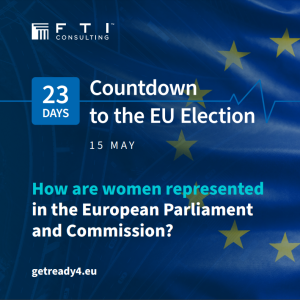Global Public Affairs Newswire – 17 May 2024
Welcome to the latest edition of FTI Consulting’s fortnightly Global Public Affairs Newswire. In this installment, we look ahead to the imminent General Election in South Africa and assess the uncertain prospects for the governing African National Congress party. We also bring you our usual comprehensive market update, which offers analysis on the latest trending developments from a number of the world’s major markets. This week, our teams in Paris and Shanghai provide an in-depth assessment of President Xi Jinping’s recent visit to Europe and Emmanuel Macron’s own latest efforts to woo tech investors at this year’s ‘Choose France’ summit. Further afield, we unpack the landmark transition of power that has occurred in Singapore, whilst our team in Brussels looks ahead to the upcoming Hungarian Presidency in the European Union.

Our global team are closely tracking the key votes and contests in this worldwide ‘Year of the Election’. In each edition of the Newswire, we look to dive into the upcoming implications, considerations, and opportunities for business.

With just under two weeks to go before the South African General Election, national polls continue to indicate that the African National Congress (ANC) might experience its most significant decline since the dawn of democracy in the country. A recently published IPSOS poll has shown a further decline for the ANC in comparison to previous IPSOS polling.
Recent figures have put ANC vote share at 40.2%, whilst support has strengthened for the official opposition, the Democratic Alliance (DA) at 21.9%, and a surprising downturn for the Economic Freedom Fighters (EFF), with their voter support at 11.5%, down from the 18% in the IPSOS October 2023 poll. Meanwhile, former President Jacob Zuma’s Umkhonto WeSizwe (MK) Party is demonstrating persistent growth among the South African electorate, with support standing at 8.4%.
With these latest results, the governing party has gone into full election mode, hoping to retain its majority. The party has summoned all the officials from the different party structures and its alliance partners to a campaign trail in KwaZulu-Natal, which is perceived as former President Zuma’s stronghold.
In Gauteng, the economic hub, where the ANC lost three major metros in the 2021 local elections, the party has deployed some of its respected stalwarts and political heavyweights, including former Presidents Thabo Mbeki and Kgalema Motlanthe. Meanwhile, former President Mbeki has subsequently suspended his participation. Former Executive Director of UN Women and Deputy President, Phumzile Mlambo-Ngcuka is also on the ANC campaign trail. The deployment of former party leaders comes after President Ramaphosa called on senior members of the party to avert the possible loss of power with the emergence of the MK Party and other new political movements.

Former President Donald Trump is polling ahead of President Joe Biden among registered voters in five of six critical battleground states, according to new surveys released this week. The results of the survey has Trump leading Biden in Michigan, Arizona, Nevada, Georgia, and Pennsylvania – all of which are considered states that could ‘swing’ to either Democratic or Republican candidates, and are therefore most important for candidates to win in the electoral college system. Among registered voters in the poll, Biden leads Trump in Wisconsin, a state he won in the 2020 election.
Debates?!: In an unprecedented move in modern presidential politics, President Biden challenged President Trump to two debates in the coming months, to which Trump immediately accepted. It surprised most political observers: US presidential debates traditionally have been organized by a non-partisan and prestigious Commission on Presidential Debates. The first is scheduled by CNN for June 27, and a second hosted by ABC on September 10. Independent candidate Robert Kennedy Jr. is not included in either, as he currently has failed to gain ballot access in all states.
Who’s Tougher on China?: Biden announced this week that his administration is increasing tariffs on $18 billion worth of Chinese imports, attacking Beijing’s reach on the EV market. The Trump campaign responded to the announcement arguing that the tariffs do not go far enough, with the former President threatening to create a 200 percent tariff on auto imports coming from Mexico, should he be successful in November.
Biden Working on Base Vote Support: This week a top Biden campaign pollster admitted Biden’s team must attract greater support from key demographic groups who have historically favored Democratic candidates, if he is to be re-elected – particularly with younger voters, black voters, and Hispanic voters. The Biden campaign is therefore ramping up outreach efforts to these communities, following polling suggesting Trump would perform as well as Richard Nixon in the 1960 campaign amongst black voters, when he secured 23% of the black vote against Jack Kennedy. Trump is also closing the gap on Biden with Hispanic voters, polling at 42% to Biden’s 45% in this demographic, while younger voters between 18-29 – a demographic who voted for Biden in 2020 – are favoring Trump 46% to 42%.

During a speech in Denmark on 14 May, European Commission President, Ursula von der Leyen highlighted foreign interference as a major concern ahead of her campaign for a second term.
She emphasized the need for stronger action to combat foreign meddling, particularly via online disinformation, and to safeguard European democracy. Von der Leyen’s remarks followed reports of increased malign foreign influence, particularly from Russia, aiming to manipulate public opinion and disrupt elections. Von der Leyen proposed establishing a ‘European Democracy Shield’ to coordinate efforts against foreign interference, including setting up a disinformation unit and introducing new rules to address emerging technologies like AI deepfakes. Despite existing legislation such as the Digital Services Act, von der Leyen stressed the need for more ambitious measures to protect European democracy.

Yesterday, the Leader of the Labour Party, Keir Starmer delivered a major pre-election pitch to voters, where he outlined ‘six steps’ his party will take if elected to government after the next UK General Election.
In short, the pledges distill Labour’s ‘retail offer’ to British voters and include commitments to: deliver economic stability via tough spending rules; cutting health service waiting lists via 40,000 more appointments each week; launching a new ‘border security command’ to cut illegal immigration; setting up a new publicly owned clean power company; recruiting 6,500 new teachers; and taking steps to reduce anti-social behavior in communities.
Starmer said that all the steps are “fully costed, fully funded and ready to go”, and Labour would “roll up our sleeves, do the hard graft and deliver a decade of national renewal”.
Meanwhile, this followed on Monday, Prime Minister Rishi Sunak, who delivered a major foreign affairs speech where he warned voters that the UK faces “dangerous times” ahead. He sought to strongly delineate his approach to Labour’s own security policies and set out a ‘safer with the devil you know’ argument.
Core to his argument, Sunak underlined his “generational” commitment to increase UK defense spending to 2.5% of GDP by 2030. This is a target that Labour (which has also doubled down on its own security rhetoric) has matched in terms of numerical commitment, however they have so far refused to commit to any equivalent timeline.
Remaining stuck behind Labour in the national polls, there is perhaps some logic here to Sunak’s focusing of political attacks through a security lens. Defense remains one of the last few issues under which the Conservatives lead Labour in polling, and it is likely that we will see this tact employed more and more as the election approaches.
Market updates

After a tumultuous set of events in the past few weeks, the Petro administration faces growing urgency to find alternatives for its stalled government agenda. First, the Constitutional Court nullified the creation of the Ministry of Equality, a flagship of Petro’s social justice proposals. Then, Congress rejected the Healthcare reform, his legislative priority. And finally, claims of embezzlement over a contract worth over USD$12 million have undermined legitimacy and public trust on the administration.
After initially considering a National Assembly in March, President Petro then proposed in early May convening a referendum to approve the stalled social reforms. Although a legitimate option, implementing this instrument requires approval from Congress and review by the Constitutional Court: two institutions that have historically represented an effective counterweight.
Despite the absence of concrete progress in key areas such as peace, agrarian reform, or employment, the proposal to convene a constituent assembly has limited to no institutional support.
Given the increasing tension between the Executive and the Judicial and Legislative branches, it appears that the Government will only be able to make progress on issues where it can unilaterally act through decrees. This approach, however, would sacrifice the possibility of achieving genuine national consensus and undermine the legacy it aspires to leave behind.

On Wednesday 8 May, the MP for Dover, Natalie Elphicke confirmed her defection to the Labour Party from the governing Conservatives, crossing the floor of the House of Commons to sit on the opposition benches. This was the second defection to Labour seen in recent weeks, after ex-minister, Dan Poulter MP also left the Conservatives in April. In her statement, Elphicke criticized that the Conservatives under Prime Minister Rishi Sunak have become a “byword for incompetence and division.”
However, whilst the defection gave the Labour Party leader, Keir Starmer further political ammunition, in the days following Starmer faced a backlash from his own parliamentary backbenchers. A number of Labour MPs came forward to voice their sense of betrayal over the move. Jess Phillips MP (former Shadow Minister for Domestic Violence and Safeguarding), Rosie Duffield MP and Zarah Sultana MP were amongst the discontented, citing how Elphicke’s right-leaning views and past membership of the Brexit-backing European Research Group were at odds with trade unions and Labour’s positioning on key policy areas, including environmental issues.
Despite the discontent from backbenchers however, Elphicke’s move did have an unexpected secondary effect in the form of a House of Commons vote this week. On Monday, the Government were defeated on a motion, with the Commons instead voting to ban MPs from the Westminster parliamentary estate from the point that an MP is arrested on suspicion of violent or sexual offenses. The free vote was a lot closer than expected, finishing 170-169, with some pointing to Elphicke’s vote against the government as the reason for the defeat, given it unlikely she would have voted that way had she still been a member of the Conservative benches.

The House of Representatives passed the reauthorization of the Federal Aviation Administration (FAA) this week, following the U.S. Senate last week. Completion of this Bill is the result of months of negotiations between House and Senate leaders in the U.S. Congress and an amendment process that led to an extension of the deadline twice.
This was a ‘must-pass’ piece of legislation and much of the delay in completing the Bill resulted from attempts to attach non-germane policies. Work in Congress is likely to slow down soon as members turn their attention to the November elections. As legislation becomes more focused on helping election outcomes, House Speaker Mike Johnson (R-LA) has recently shifted the House agenda to symbolic legislation designed to drive a wedge between Democrats.
Additionally, Senate Majority Leader Chuck Schumer (D-NY) unveiled a multi-year roadmap for artificial intelligence policy and has suggested he may try to complete work on the tax extenders package passed by the House of Representatives earlier this year. Beyond that, as summer approaches, Congress is likely to narrowly focus on the annual defense policy bill, government funding, and in the Senate, judicial confirmations. While lawmakers wind down ‘new’ legislation before November’s elections take over, both the House and Senate continue to paint an interesting picture for the 119th Congress.

On 15 May, 13 days before the South African national elections, President Ramaphosa signed the NHI Bill into law, a measure which has been in the works for close to 10 years.
The Bill aims to achieve universal health coverage for all, by dismantling the two-tier health system that currently services South Africans. The development of a single health system funded by government as the single payer, seeks to grant all South Africans access to free, quality healthcare at public and private facilities. A plethora of constitutional issues has been raised, including system funding (especially with a fiscally constrained national purse), the limited scope that South Africans will have to access private healthcare funded through medical insurance and the limitations on healthcare professionals in treating patients.
The President’s decision to approve the Bill so close to national elections where the ruling African National Congress (ANC) is expected to receive its lowest support to date, is being considered in some corners as a tactic to court the rural and peri-urban vote, a traditional voting bloc for the ANC. Legal challenges are incoming from business associations, medical aid schemes as well as hospital and medical professional industry associations, who have publicly voiced their disappointment.
Generally, there is support for universal health care in the country, but through the retention of public and private healthcare facilities already available in South Africa. The 7th administration will be tasked with managing the potential legal challenges of this move, as well as the implementation of the NHI over the next 5 years.

The annual summit of French and international business leaders, ‘Choose France’, took place in Versailles on Monday. The Presidency announced a record €15 billion secured in foreign investment – up from €10 billion last year – going to 56 projects. Choose France is geared towards showcasing pro-business reforms and announcing significant FDI projects in France. It has become an unofficial barometer on the ability of the French economy to attract foreign businesses. The Presidency has not shied away from underlining that France remains the most attractive economy in Europe for the fifth year running.
The focus this year has undoubtedly been tech, with significant announcements made by a number of global corporations. In an interview with Bloomberg, President Macron also sought to defend reforms that have been undertaken since 2017, notably tax cuts and labor market changes, and mentioned that there is still much work to be done, in a nod to the upcoming Simplification Bill, intended to further slash red tape.
Macron also mentioned that the four pillars of EU growth, which were taken for granted, are now fading: low-cost energy from Russia, low-cost production thanks to central and Eastern Europe, a market for exports in China, and a geopolitical cover from the US. He believes this now as a result means that there is an imperative Europe to ‘reinvent itself’.
The main announcements at the Summit will no doubt please the Presidency, as Emmanuel Macron has repeatedly said that French and European sovereignty depends on mastering new technologies and on controlling supply chains in key areas.

Deputy Prime Minister, Lawrence Wong was sworn-in as Singapore’s new Prime Minister on 15 May, succeeding his now predecessor, Lee Hsien Loong in a historic transition of power – only Singapore’s third since its independence in 1965. Present at the swearing-in ceremony was President Tharman Shanmugaratnam, Chief Justice Sundaresh Menon, and Wong’s cabinet ministers.
Prior to assuming his new role, Wong – who is also finance minister – announced several changes to the cabinet. While all ministers under Lee’s cabinet were retained, Prime Minister Wong will be supported by 2 Deputy Prime Ministers. This was after Trade & Industry Minister, Gan Kim Yong was also given the role of Deputy Prime Minister; he will serve as Acting Prime Minister should the need arise. Separately, Lee will remain in cabinet as ‘Senior Minister’ – an honor traditionally accorded to past prime ministers since the days of Singapore’s founding father, Lee Kuan Yew.
In his inaugural speech as Prime Minister, Wong signaled a new style of leadership, saying “We will lead in our own way. We will continue to think boldly and to think far. We know that there is still much more to do… and the best chapters of our Singapore Story lie ahead”. Wong also underscored his government’s commitment to Singapore’s principles as he saw them growing up: “My generation’s story is the story of independent Singapore. Our lives are testimony to the values that forged our nation – incorruptibility, meritocracy, multiracialism, justice, and equality.”

The upcoming Hungarian Presidency has outlined seven key priorities aimed at addressing pressing challenges facing the European Union (EU), notably underscored by the conflict in Ukraine, economic competition, security vulnerabilities, illegal migration, climate change, and demographic shifts.
These priorities include, enhancing EU competitiveness through holistic approaches; strengthening European defense capabilities and cooperation; advancing consistent and merit-based enlargement policies; curbing illegal migration through external cooperation and innovative asylum solutions; shaping the future of cohesion policy to address regional disparities and demographic challenges; ensuring food sovereignty with a farmer-centered agriculture policy; and managing demographic changes, while respecting Member States’ autonomy.
The Presidency intends to advance these objectives during its term that will start on 1 July 2024 until the end of December 2024, emphasizing collaboration and strategic initiatives within the EU framework.

For the past two weeks, the state of Rio Grande do Sul has faced devastating floods due to heavy rains, leading local authorities to declare a state of public emergency. In the whole state, 89.7% of the state’s 497 municipalities are suffering directly or indirectly from the floods, with almost 150 people confirmed dead, and more than half a million displaced, as large parts of the state remain under water.
While rescue teams search for victims, civil society has rallied contributions and donation campaigns. Other measures have been announced to help the affected families with the suspension of debts, subsidized financing programs and the anticipation of social benefits. The federal government, in turn, announced the suspension of the state’s debt for three years and allocated resources for aid and reconstruction efforts for Rio Grande do Sul, which represents about 6.4% of the country’s total GDP. Similarly, the New Development Bank, the BRICS multilateral bank, announced that it will allocate US$1.115 billion to the state to support reconstruction efforts.
Some experts are pointing out that the scale of this disaster is already comparable to that of Hurricane Katrina, which hit the southern coast of the United States in 2005. Although official reports on the disaster’s economic consequences have not been produced, several industries are expected to report heavy impacts – with agriculture, services and insurance standing out. In any case, the federal government is already anticipating a substantial impact on the country’s macroeconomic indicators. Moreover, questions are already beginning to circulate about the preparedness of the state government for such a disaster and what types of public policies should other states begin to develop to prepare for similar incidents in the future.

BBVA’s recent announcement of a hostile takeover bid for Banco Sabadell represents a landmark event in the Spanish financial sector, carrying significant implications for both Spain and the broader European banking landscape. This strategic move by BBVA, underscores a bold attempt to consolidate market share amid escalating competition and regulatory challenges.
This development comes at a time when Spain is already in the spotlight, following a dramatic shift in the political environment in Catalonia, marked by PSC’s – the regional branch of the national socialist party PSOE – victory in the regional elections and the sound defeat of independentist forces.
With an estimated transaction value around €11 billion, the bid, if successful, will not only catapult BBVA ahead in domestic rankings, but also significantly augment its stature on the European stage. The combined entity would emerge as a powerhouse with enhanced capabilities in lending and digital services, positioning it as a formidable contender against major European banks.
The proposed merger is expected to generate substantial cost synergies, approximately €850 million within three years, primarily through streamlined operations and technological integration.
However, the bid faces considerable hurdles, not least from the Spanish government, which has expressed strong reservations. Citing potential adverse impacts on employment and service provision, the government’s stance highlights the delicate balance between fostering industry growth and maintaining competition.
Understanding the nuances of this transaction is crucial. It reflects the evolving dynamics of the European banking sector, where consolidation might be necessary for global competitiveness and growth, but not without comprehensive regulatory scrutiny and socio-economic considerations. Moreover, the outcome of this takeover could set a precedent for future mergers and acquisitions within the banking industry across Europe.

As we count down to Ireland’s next general election (due before March next year), the prospect of Sinn Féin’s first ever term in government in the Republic is changing their approach to engaging with the business community. In recent weeks, Sinn Féin’s Finance Spokesperson, Pearse Doherty attended a briefing with investors in London, where he provided insights into the party’s key economic policies and their thoughts on the next election as the party continues to lead in the polls.
A note following the briefing revealed that Doherty told investors that Sinn Féin expects to be the leading party following the next general election and is open to government formation talks with all political parties. The need for continued, strong economic performance to fund its promised improvements in areas such as housing, health and education means that the party has softened their position on key policy items; and is not advocating for a change in corporation tax or Ireland’s FDI policy. While the party is still proposing what it calls a “3% solidarity tax” for those earning over €140,000, Doherty told those present that he does not believe this will impact FDI, or talent attraction and retention. Sinn Féin said it fully endorses the current government’s approach to windfall corporate tax receipts; however, if they enter government, they may seek to use some of the funds for infrastructure and housing rather than for investment funds. Doherty also told investors to expect a referendum on a united Ireland this decade – unsurprising, as it is a key policy of Sinn Féin who now face the prospect of being in power both sides of the border.

Marking his first trip to Europe in five years, President Xi’s visit to the three countries came at a critical time for China-EU relations. Here are three takeaways:
First, fundamental EU-China differences persist, with no concessions made by China on trade disputes and on claims of overcapacities in Chinese production. This is despite the trade imbalance being a priority for French President Macron and EU Commission President, Ursula von der Leyen. Under growing tensions, Xi refuted the overcapacity claim and instead stressed the mutually beneficial nature of China-EU cooperation, suggesting a course for deepened bilateral trade and investment, somewhat at odds with the EU’s “de-risking” initiatives.
Second, China’s multipolar perspective is aligned with France’s strategic autonomy ambition. While Xi’s visit was more about damage control, President Macron made progress in cementing his personal relationship with Xi, attempting to position France as a crucial partner. President Macron appeared also more open to accommodating China’s interests and concerns in global affairs as the two countries made a joint statement on the conflicts in the Middle East, delivering a concerted voice for peace and stability.
Third, strengthened ties in Serbia and Hungary will further expand China’s footprints in Europe and pave the way to deepening trade with the single market. In Belgrade, the Serbian President, and Xi hailed their “ironclad partnership” and announced a free-trade agreement, taking effect on 01 July. In Budapest, Xi pledged investments into transport and energy, including a US$2.1 billion project to link the capitals of Hungary and Serbia. Most importantly, Hungary, an EU member, is strategically relevant as a gateway for Chinese goods and technologies into the single market, with growing Chinese investment in the country on EVs and batteries. As an immediate outcome, China’s Customs authority has dropped some non-tariff barriers on fruits and animal products from Serbia and Hungary.

The 36th Party Congress of the Christian Democratic Union (CDU) was held in Berlin from 6 to 8 May. At the Congress, Friedrich Merz was re-elected as Chairman of the CDU with 89% of the votes. During the conference, Merz made moves to prepare the party’s members for the final leg in the European election campaign and an envisaged, eventual return to the Federal Government. According to him, the CDU would be ready to assume responsibility for Germany again immediately, and at the latest after the Federal Elections in fall 2025.
Although the issue of a chancellor candidacy was not on the official agenda, it played a central role at the congress. Friedrich Merz wants to be the CDU/CSU’s top candidate for the 2025 federal election – a role he would historically be entitled to as party leader. Although the final decision will not be made until after the state elections in Saxony, Thuringia, and Brandenburg in the fall of 2024, the convention was an important step on the path to the nomination. Merz is undisputed as Chairman, but not as the top candidate: in addition to him, the Minister Presidents of North Rhine-Westphalia and Bavaria, Hendrik Wüst (CDU) and Markus Söder (CSU), are also being considered. Both are ahead of Merz in polls.
Compared to the expectations of many party insiders and the course of the convention, Friedrich Merz’s election result of 89% was rather disappointing and reflects the party’s skepticism that has less to do with Merz as party leader than with Merz as a possible candidate for chancellor. In this respect, the delegates have reopened the question of the CDU/CSU-candidacy for the chancellorship.
Expert Analysis |
EU Elections podcast
With less than a month until the EU elections in June, The Electoral Pulse hosts Anne-Sophie Deman and Jeremy Van Gorp sit down to discuss what has happened so far and what comes next. There’s still plenty of time for dynamics to shift and big electoral news so stay tuned as we begin the countdown to the elections!
LATAM Insights report
Latin America’s energy shift isn’t a monolithic movement, it’s a complex web of risks and opportunities. Diverse national strategies are leading the regions unique path towards a sustainable economic development. Our team discuss the multifaceted energy transition in Latin America.
UK elections – Conservatives down but not yet out
With the dust now settling on the results of the local and mayoral elections, Conservative strategists can at least take heart in the validation of their expectation management techniques. Our UK PA team share some thoughts on what this set of elections means for the Conservatives.
Countdown to EU Election: how are women represented?
In the past five years, leaders in the EU institutions have pushed for improved gender parity and equity. While there will always be more work to be done, the EU has come a long way. Our Brussels team look at this closely.
Upcoming Conferences, Elections and Webinars
- 19 May: General Election (Dominican Republic)
- 20 May: General Election, fifth phase (India)
- 25 May: General Election, sixth phase (India)
- 29 May: General Election (South Africa)
- 01 June: General Election, seventh phase (India)
- 02 June: General Election (Mexico)
- 06-09 June: European Parliament Election (European Union)
- 09 June: Federal Election (Belgium)

To be added to the distribution list for the Global PA Newswire, or for further information on the dedicated Public Affairs team at FTI, please contact [email protected]. |
The views expressed in this article are those of the author(s) and not necessarily the views of FTI Consulting, its management, its subsidiaries, its affiliates, or its other professionals.
©2024 FTI Consulting, Inc. All rights reserved. www.fticonsulting.com







